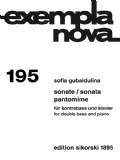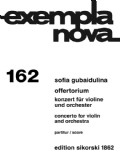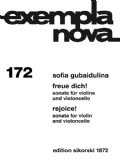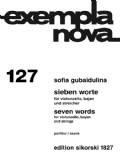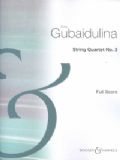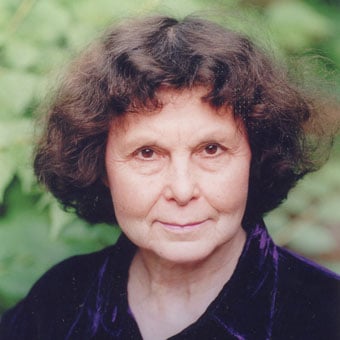
Sofia Gubaidulina
An introduction to Gubaidulina’s music
by Gerard McBurney
The USSR was an empire. And like all empires it contained within itself a multitude of variegated cultures and nationalities, more or less (and often uneasily) held together by two parallel and intertwined hegemonies: a newer Soviet ideology and power-structure; and an older Russian tradition of linguistic, cultural, economic and military domination of a whole span of the northern hemisphere from Eastern Europe to the Sea of Japan.
Most aspects of Soviet culture reflected the tensions and paradoxes implied by such a paradoxical carapace, and the music of the unusually talented generation of composers that appeared in the USSR in the late 1950s and early 1960s during the so-called Khrushchev Thaw was no different. These young artists for the most part knew one another and spoke Russian, studied and gathered together in the imperial capital that was Moscow, and often shared working vacations in the various far-flung Composers’ Union retreats from Soviet Karelia in the north to Georgia and Armenia in the south.
At the same time, each composer was rooted in their own strikingly different world, most with their own languages and traditions: Silvestrov and Hrabovsky, for instance, in Ukraine; Arvo Pärt in Estonia; Kancheli in Georgia; Mansurian and Terterian in Armenia; Felix Yanov-Yanovsky in Uzbekistan. And even those composers who came from within the specifically Russian orbit were still scattered over a vast area and displayed different allegiances: Ustvolskaya, Tishchenko, Slonimsky and Knaifel, musically unalike, were all deeply composers of the northern city of Leningrad/St Petersburg, with its distinctive ‘window on Europe’ (Pushkin’s phrase) and its particular history and identity; Alfred Schnittke, born in a provincial city on the Volga river, retained deep links through his parents to German and Jewish culture; Denisov, though he spent most of his life in Moscow, combined a fascination for the language, literature and music of faraway France with unflinching loyalty to his roots in even-further-away Siberia.
Like her contemporaries, Gubaidulina was a child of this world. And like theirs, her story has a character of its own, which similarly and vividly reflects those same half-centripetal, half-centrifugal imperial forces that shaped the lives and music of them all. She was born and raised in the Tatar Autonomous Soviet Socialist Republic, one of many quasi-independent republics within the vast Russian Soviet Federative Socialist Republic, itself merely a part of the greater USSR (these protean ‘autonomous republics’ were designed to partition and give individual ‘homes’ to the huge range of peoples and nationalities contained with the empire… in other words, they were a form of political and ethnic control). Gubaidulina’s father was a native Volga Tatar, part of the local population (the surname is Turkic in origin), but her mother was of Slavic descent, with roots in Russia, Poland and elsewhere. Though born in the small town of Chistopol, the young composer spent most of her early years in the Tatar capital of Kazan, a large city on the river Volga, celebrated for the Siege of 1552 when Ivan the Terrible overthrew Tatar power and established the whole area as part of Russia.
Gubaidulina herself has often spoken of the effect of the varied influences from her childhood on the shaping of her artistic personality. Although she never learned to speak Tatar – it was a language, she said, her father kept for communicating with his friends – she is adamant that elements of Tatar culture from all around, and especially from her father’s love of silence, impressed her and seeped into her. Through her mother, by contrast, she felt connected to Russian and more western Slavic traditions. She has also noted that several of her much-loved music teachers in Kazan were of Jewish extraction, and she considers contact with Jewish traditions another important element in her upbringing.
Her fascination with religion – so obvious from her life’s work - also began early. Her parents, shaped by the ‘scientific atheism’ of early Soviet years and loyal to the Communist Party, were hostile to such ideas, but Gubaidulina was fascinated from childhood by the figure of her paternal grandfather, whom she knew only from a photograph but who was a mullah (Tatars were and are traditionally a Muslim people); and one day when she was small, at the home of an acquaintance of her parents, she saw for the first time a Russian Orthodox icon: “and I recognised God”.
In the late 1950s, after graduating from the Kazan Conservatory, she moved to Moscow, where she continued musical studies as a post-graduate at the Tchaikovsky Conservatory, and was taught by, among others, the distinguished figure of Vissarion Shebalin. She also memorably encountered Shostakovich, and established contact with key figures from her own generation including Schnittke and Denisov and, importantly, the circles around Andrei Volkonsky who, as another young Russian composer of the same era put it, “was the most colourful of us all”.
Volkonsky, a composer and harpsichordist, slightly younger than Gubaidulina, was born into an émigré aristocratic family living in Switzerland and France, and was there taught by or met such major figures such as Dinu Lipatti, Rachmaninoff, Messiaen and Nadia Boulanger, before his family relocated to Moscow in 1947 where he enrolled as a student in the Moscow Conservatory. For his Soviet contemporaries like Gubaidulina, Volkonsky was therefore a direct link to an exotic Western world with which they had not previously had any contact. Among much else, he had a wide knowledge of early music from the Middle Ages to the Baroque; and had personally met key figures in the explosion of avant-garde experiment at the end of World War 2.
All these new experiences and stimulations in the Soviet capital fed further into Gubaidulina’s deep hunger to explore and create a music fundamentally different from the mainstream Soviet routine around her. By her own account, several elements were important in giving her the strength and independence to achieve this.
First, her gender. While others have understandably read the position of women in Soviet society in a different way, Gubaidulina is combatively insistent that being a woman played to her advantage: “Those in charge, mostly men, did not take me seriously. I was not as harshly punished or criticised as Schnittke and Denisov, because I was dismissed as ‘just a woman’ and even as ‘quite mad’. And that left me free to carry on as I wanted.”
Then there was cinema. Like most of her contemporaries, Gubaidulina earned her living for many years from film music: “Six months I write for films, take a month off to recover my health and the rest of the year I write my own music.” As others did, she found the technical discipline of working quickly was good training, and the relative lack of ideological musical oversight in the Soviet cinema meant she could use film scores as a space within which to develop her ‘real’ musical language. Intriguingly, she found this was especially true when writing music for cartoon films for children.
And then there was the rich and daring world of performers of new music in Moscow at that time. From early on, Gubaidulina formed close relationships with percussionist Mark Pekarsky, cellist Vladimir Tonkha and accordionist Friedrich Lips; later, in the 1980s she began to work with soloists with more mainstream international reputations like Gidon Kremer, Oleg Kagan and Natalia Gutman, and eventually Rostropovich. All of these had a profound effect on her way of writing, and she has always been open about the extent to which in any new piece is the result of an equal collaboration between composer and performer.
In 1975, with two composer-colleagues, Viktor Suslin and Vyacheslav Artyomov, Gubaidulina founded an improvisation group, Astreia, with two aims: to explore the sounds of exotic instruments many of which came from the eastern part of the USSR; and to discover a deeper impulsive and instinctive freedom, especially in the area of sound for its own sake (for Gubaidulina, an extremely important matter). The acoustic and inner worlds uncovered by her work with Astreia quickly became an important element in her written compositions.
And finally, there was the deep influence on her of the theoretical and philosophical thought of her friend, companion and, later, husband, Pyotr Meshchaninov (who died in 2006). Meshchaninov’s almost mystical speculations in the field of rhythm and proportion, by her own account, enabled Gubaidulina to develop her subtle and highly distinctive approach to musical structure and form.
Gubaidulina’s international reputation really began to grow in the early 1980s with the appearance of her magnificent first violin concerto, Offertorium, written for Gidon Kremer and profoundly inspired by his spectacular style of playing. The huge success of this piece led to more and more commissions from international orchestras and soloists. In the early 1990s, after the fall of the Berlin Wall and the collapse of the Soviet Union, with its attendant social chaos, violence and instability, Gubaidulina moved to a small village outside Hamburg in Germany, where she at last found the isolation and quiet she was craving, and where she has lived ever since.
This move to Western Europe unleashed from the now deeply experienced composer a creative torrent. In the last 30 years she has written on the grandest scale for most of the great orchestras of the world – concertos for instruments from the flute to the Japanese koto to percussion ensemble (as well as two more violin concertos), symphonic music of several different kinds, and several large-scale works for chorus and orchestra including the St. John Passion of 1999. Over these years, her religious, mystical and eschatological concerns have become ever bolder and more confrontational, culminating most strikingly perhaps in her recent, extremely dark and violent orchestral piece, The Wrath of God (Der Zorn Gottes, 2019). And she has continued to compose a great deal of chamber music, often for unusual combinations of instruments (she likes to say that composers today should spend more time writing for instruments that do not have a repertoire than for those that already do). Almost the only area of musical practice she has avoided has been the theatre. “I do not feel close to opera”, she says, but perhaps part of that is because her music is so powerfully dramatic in itself that she feels no need to add in extramusical elements.
In the early summer of 2022, musing quietly on the fact that she was now, to her own amazement, “in my nineties!”, Sofia Gubaidulina looked back over her long life of writing music and with simplicity but utter determination observed:
“Yes… that’s probably true… I think I have spent my life trying to create a kind of cathedral of sound…”
© Gerard McBurney, 2022
(Composer, orchestrator, writer, broadcaster, deviser, reconstructor of lost and forgotten works by Shostakovich.)
Bestselling Titles by Sofia Gubaidulina
-
Publisher: Anglo SovietSpecial Order: Usually despatched within 20-30 working days - Lead times may vary in the case of supplier shortages or delays$31.74
-
Publisher: SikorskiUsually despatched within 7-10 working days - Lead times may vary in the case of supplier shortages or delays$35.55
-
Publisher: SikorskiUsually despatched within 7-10 working days - Lead times may vary in the case of supplier shortages or delays$76.19
-
Publisher: SikorskiUsually despatched within 7-10 working days - Lead times may vary in the case of supplier shortages or delays$34.28
-
Publisher: SikorskiUsually despatched within 7-10 working days - Lead times may vary in the case of supplier shortages or delays$71.11
-
Publisher: Boosey & HawkesUsually despatched within 7-10 working days - Lead times may vary in the case of supplier shortages or delays$22.23




